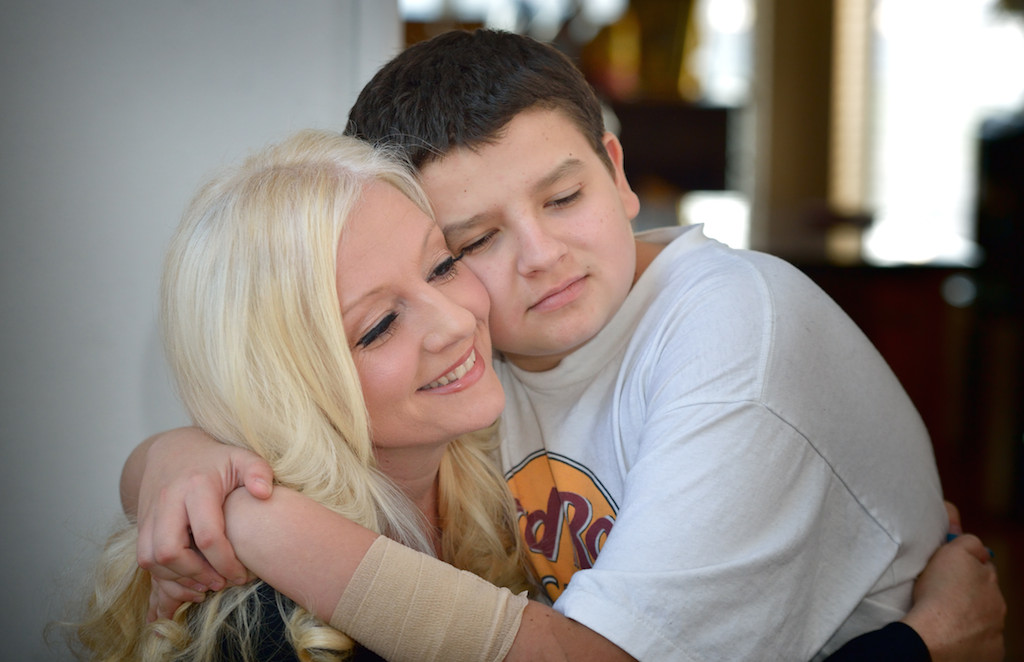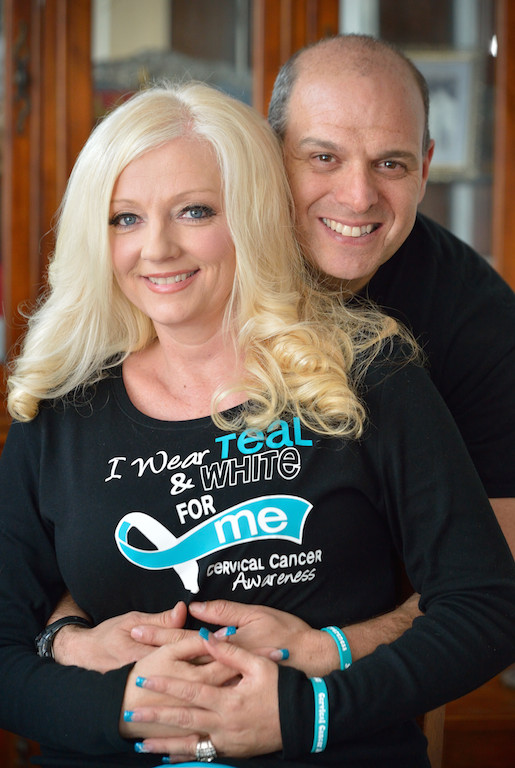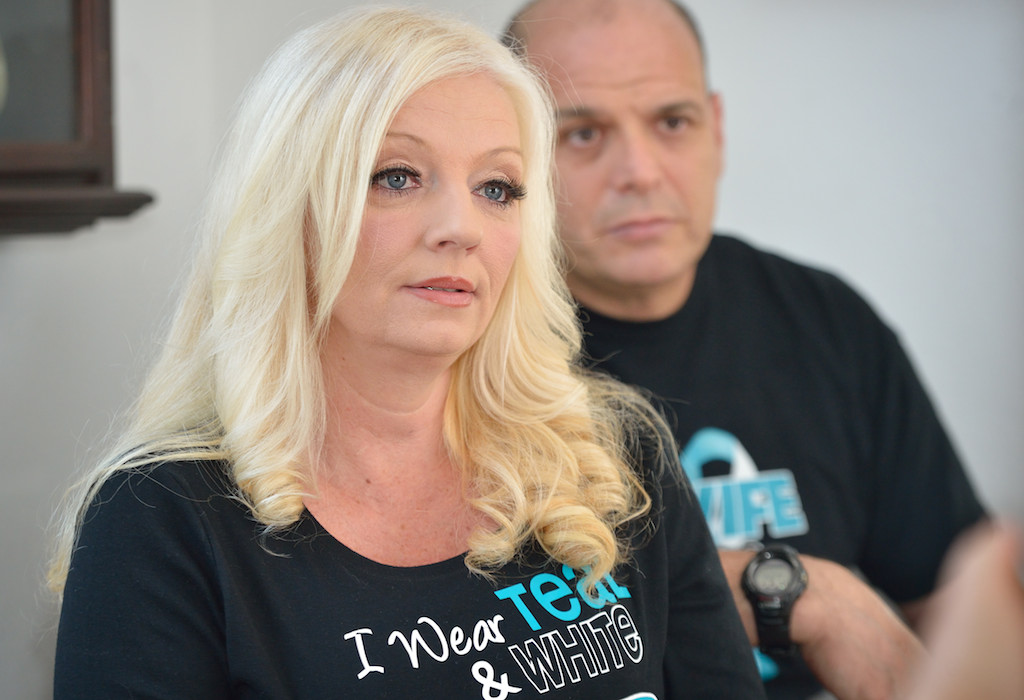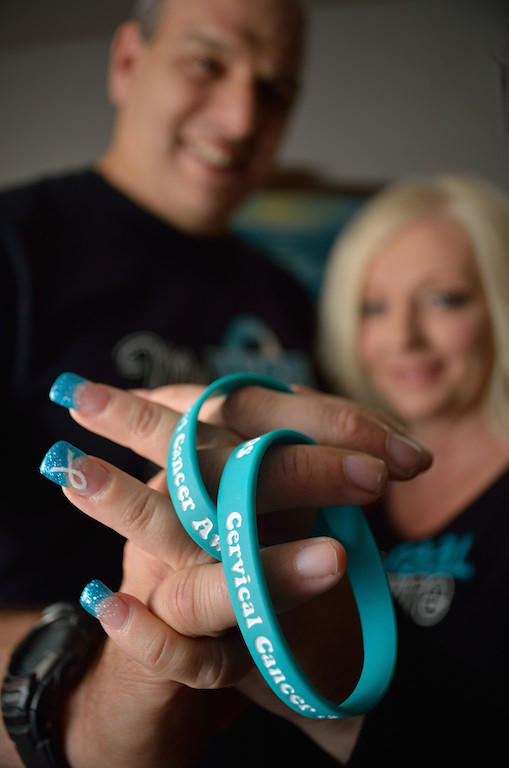La Habra Sgt. Jeff Baylos paced the hallway, the front yard, the kitchen and the bedroom.
It’s what he does when he’s on the phone and nervous.
There was no way he could sleep until he had an answer to his question, the question.
Does my wife have cancer?
His wife, Loretta, already knew the answer.
“I just had a really bad feeling in my stomach that something wasn’t right,” she said.
In 2011, Loretta, 48, was diagnosed with the human papilloma virus (HPV).
HPV is a virus that is transmitted through sexual contact and, according to the Centers for Disease Control and Prevention, it is the most common sexually-transmitted infection.
The CDC estimates every sexually active adult has contracted some form of HPV.
It can be passed with no signs or symptoms, and a woman can be infected with numerous strains at one time.
Some strains clear up on their own, while others are more dangerous.
More than 10,000 women are diagnosed with HPV-related cervical cancer every year, according to the CDC.
Seven years into her 11-year marriage with Jeff, Loretta learned she had one of the strains that could lead to cancer.
“Sometimes it can hide up to 10 years,” she said. “I never had any tests that showed I had this before.”
Jump to August 2014.
Debilitating back pain prompted Loretta to ask her doctor for an MRI, which showed a mass on her cervix.
Just nine months earlier, her gynecological exam was normal.
Tests and waiting.
More waiting and tests.
Then a vague conversation from the doctor came the night Jeff was pacing his Ontario home: “I can’t tell you the results over the phone,” she said.
Jeff pressed the doctor for the answer his wife knew was coming and he prayed was impossible.
“It’s cancer,” the doctor said.
Now that Jeff had the answer, there was no way he could sleep.
“I felt like I got punched in the stomach,” Jeff said. “My world just stopped.”
Although she braced for it, the diagnosis took the breath from Loretta’s lungs.
“You immediately think, ‘I’m going do die’,” she said.
THE FIGHT
Jeff, an officer with LHPD for 28 years, signed on to be a police officer to protect and serve.
When he married Loretta, his soulmate brought to him by Match.com, he vowed he would always protect her.
A cancer diagnosis made Jeff feel he failed his wife.
“Even if I couldn’t, I always swore I would take care of her and protect her,” Jeff said. “She got cancer, and I couldn’t stop it. I feel, in some ways, I let her down.”
Telling their family and friends was difficult, especially for their six children.
Their social world halted and work became nearly impossible for Jeff.
He would sneak into the locker room or head outside when a panic set in — he wanted to break down where nobody could see.
“I went from being this happy-go-lucky guy to being totally introverted and depressed,” he said. “I didn’t want to be away from her, yet I had a job to do.”
Although Jeff could not prevent his wife from having to wage battle on one of the most aggressive cancers a woman can be diagnosed with, he would help her fight.
He was on the phone with doctors, insurance companies and insurance advocates to get his wife the best care.
After a 26-day wait to be seen at Loma Linda Hospital because of an influx of women diagnosed with cervical cancer, Loretta and Jeff had a plan.
Doctors performed a radical hysterectomy on Aug. 28 and also removed some lymph nodes.
In the two weeks following surgery, Jennifer Price, wife of La Habra Police Chief Jerry Price, organized a meal train for the Baylos family.
Members of the La Habra PD drove to the Bayloses’ home every night to deliver food — homemade Mexican, Olive Garden and barbecue fare.
“She was just amazing, she was my rock,” Loretta said of Jennifer Price. “She organized that whole thing and was always checking in on me.”
Four weeks after the surgery, Jeff and Loretta sat in a Loma Linda medical office waiting to hear if doctors removed all the cancer.
The doctor squirted soap into her hands, ready to place them under the running water as she delivered the news.
“As of right now, yes, (Loretta) is cancer free’,” she told the Bayloses.
Overwhelmed, Jeff gave the doctor an emphatic high-five, sending soap flying in the exam room.
“It was as if the world was lifted off our shoulders,” Jeff said.
BECOMING AN ADVOCATE
Although Loretta is currently cancer free, her battle is far from over as she continues healing and undergoing tests to check for recurrence.
“These next five years are going to be scary for me,” she said. “I don’t have cancer now, and I’m hoping and praying it stays like that.”
Loretta’s experience has inspired her to become an advocate and educate women about HPV-related cervical cancer.

Dylan Baylos, 11, hugs his mom, Loretta, a cervical cancer survivor. Photo by Steven Georges/Behind the Badge OC
“I’m not embarrassed or ashamed,” Loretta said. “I’m out here to save lives and that’s what I want to do.”
Loretta is already delivering on that mission.
She and Jeff paid for teal ribbon magnets for the department’s entire fleet that will be displayed all January in honor of Cervical Cancer Awareness Month.
The department’s teal ribbons are already gaining nationwide attention.
“We’ve had women call from all over, including Texas and Idaho,” Jeff said. “There are other departments who have reached out to my wife to ask how they can get those ribbons on their cars.”
Loretta will talk to any woman who will listen about the importance of early screening.
“Cervical cancer research is not getting enough funding and not getting enough awareness,” Loretta said. “I’m just one individual person and I’m going to do whatever I can.”
She continues to research HPV-related cervical cancer and participates in several online communities where she bonds with women who are fighting a similar battle.
Many of those women were not lucky enough to have days that end with a soapy high-five in an exam room.
“We are losing a lot of young women,” Loretta said. “It’s now an epidemic.”
New guidelines released by the American Cancer Society in 2012 discourage yearly pap smear exams for women who have had previous normal tests.
As a result, many insurance carriers will not cover yearly exams unless a patient is high-risk.
“That’s a death sentence,” Loretta said. “These cancers grow very aggressively. Mine grew in nine months.”
Along with the decals on the back of LHPD vehicles, Loretta plans to hold a rally this month and eventually wants to start lobbying for insurance companies to again cover yearly exams.
By rallying supporters and survivors, she will honor those who have lost the fight.
“I just feel in my heart this has to come out because it’s a huge issue,” she said through tears. “I will be the advocate when they can’t speak anymore.
“I will be their voice.”
 Behind the Badge
Behind the Badge





